- Home
- Sara Craven
Count Valieri's Prisoner Page 3
Count Valieri's Prisoner Read online
Page 3
So far, so good, she thought, wondering if Puccini’s name was significant. After all, Floria Bartrando’s first important role had been Musetta in ‘La Boheme’. She’d received rave notices, completely eclipsing the woman playing Mimi. In fact, several critics thought she’d been miscast, and that her voice was more suited to the dramatic coloratura range of the leading part.
And her short but starry career had fully justified their opinion.
So maybe she simply disappeared because of death threats from other sopranos, thought Maddie, faintly amused.
But there’d been little to smile about since then. Jeremy had reacted badly to the news that her trip was definitely going ahead, and there’d been a definite coolness between them ever since. But that, she told herself, was probably due to his father giving him a hard time.
She had really hoped he would relent sufficiently to see her off at the airport, but there was no sign of him.
In the departure lounge she’d sent him a text— ‘You’d better be pleased to see me when I get back’, adding a row of kisses, but there’d been no response to that either and she’d boarded the plane, edgy and with the beginnings of a headache as she fought her disappointment.
When the trolley came round, she bought some orange juice and took a couple of painkillers, then settled back in her seat, deciding to close her eyes for a few moments.
But when the next sound she heard was the captain’s voice announcing they had begun their descent to Cristoforo Columbo Airport, she realised, startled, just how tired she must have been.
As the plane turned inland, she caught her breath as she saw ahead of her, in fold after jagged fold, the peaks of the Apennines, some of them still streaked with snow.
She knew, of course, that in Italy, the mountains were never too far away, but these seemed almost too near. In some strange way—almost alien.
But she would begin an even closer acquaintance with them when she reached Trimontano, she reminded herself as the aircraft touched down.
While visualising them as threatening in some way was being over-imaginative, and showed the kind of stress she’d been under lately.
And which she’d come here to escape.
As she emerged from Arrivals, she was approached by a uniformed official.
‘Signorina Lang?’ His smile reassured her. ‘I have been asked to escort you to the Count’s car. Camillo, his driver, speaks no English.’
‘Oh,’ said Maddie. ‘Well—that’s very kind.’
This Count must be a real force to be reckoned with, she decided, as she was conducted through the terminal and out into the warm May sunlight to what appeared to be a private parking area, where a grizzled man in a chauffeur’s uniform was waiting beside a limousine.
Well even if this turns out to be a journey to nowhere, Maddie thought with slight hysteria, as he inclined his head unsmilingly and opened the rear passenger door for her, at least I’ll have travelled in style.
She’d been right, she told herself, leaning back against the cushions, to opt for a trim navy skirt rather than her usual jeans, although her jacket, which had received a faintly disparaging glance from Camillo, was denim. But she was glad of it once the car moved off, and the air conditioning came into play.
In front of her was a square leather case, which on investigation proved to be a cold box, containing bottled mineral water and fruit juice.
Every comfort, in fact, she thought. However, it would all have been rather more pleasant if Camillo had only spoken some English and she could have questioned him about their route and Trimontano itself.
He might even have been able to tell her something about Floria Bartrando’s connection with this area, especially as the singer had been living and working far away in Rome just before her disappearance, and winning plaudits for her interpretation of Gilda in ‘Rigoletto’.
But perhaps this should be left to the Count.
The port and its environs were soon left behind, the car powering its way through heavy traffic on a broad, busy road. Then, after about fifteen minutes, they turned on to another much narrower road, and, as if someone had flicked a switch, the landscape changed. No more urban sprawl or industrial development, but chestnut trees, olive groves and scrubby pastureland covering the foothills of the mountains, and the occasional scattered hamlet, clinging to the slopes.
The traffic they encountered now consisted mainly of farm wagons, groups of hikers sweating under large rucksacks, and packs of red-faced cyclists pounding up the increasingly steep ascent.
Maddie, drinking some water from the silver cup provided for the purpose, was ignobly glad not to be of their number.
At the same time, she became aware that the brightness of the day had faded, and that heavy clouds were massing round the peaks in a frankly ominous way.
Bad weather would be disappointing, she thought with an inward shrug as the vision of sun-kissed villas and cypresses silhouetted against an azure sky began to fade, but, after all, she wasn’t here as a holidaymaker.
Nor had she expected Trimontano to be quite so remote—not when it was the centre of an annual opera festival. The audiences would need to be serious music lovers to make this kind of journey.
And what had possessed Floria Bartrando to forsake the world stage and bury herself among these mountains?
There had to be a real story here if only she could unravel it, she thought, impatient to get to her destination and make a start.
A few minutes later, the car reached a fork in the road, and Camillo turned off to the right and began to descend into a valley, shadowed by a group of three tall peaks.
And there, suddenly, was Trimontano, like a toy town cupped in the hand of a stone giant.
Maddie leaned forward, eagerly scanning the clustering red roofs below her, noticing how a tall bell tower rose out of the midst of them, startlingly white and pointing towards the darkening sky like an accusing finger.
And at the same moment, like a warning voice reverberating between the mountains, came the first long, low rumble of thunder.
Heavens, thought Maddie, sinking back in her seat. That’s a hell of an introduction. Good job I’m not superstitious, or I might just be having second thoughts.
It had already begun to rain when the car finally came to a stop in front of the massive portico of the Hotel Puccini in the main square.
A uniformed man, holding an umbrella, came down the steps to open the car door and shelter Maddie on her way into the hotel, while Camillo followed with her solitary bag.
Which should, of course, have been a matched set of Louis Vuitton, Maddie realised as she looked around at the expanse of marble, mirrors and gilded pillars which made up the hotel foyer. She turned to thank Camillo and found herself watching his retreating back.
He’s clearly used to a better class of passenger, she told herself ruefully as she walked to the reception desk.
But the receptionist’s greeting passed no judgement, and the formalities were dealt with swiftly and efficiently.
‘And there is also this, signorina.’ He handed her an envelope along with her key card.
‘From Count Valieri?’ she asked.
‘Naturalmente. On whose behalf, I am to welcome you to Trimontano.’ He smiled, making a slight bow. ‘You are in Number 205, signorina. The lift is behind you, and your luggage is already in your room. If you need further assistance you have only to ask.’
Rule one in a strange town—know the right people, Maddie thought as the lift took her smoothly to her floor.
Her bedroom was more modern than she had imagined, with an impressive range of fitted furniture in an elegant pale wood, together with the widest bed she had ever seen.
The bathroom was breathtaking too, tiled in white marble, streaked with gold. It had a large sunken tub with two cushioned head-rests, and a walk-in shower also big enough for dual occupation, and then some.
The ultimate in togetherness, Maddie thought, suppressing a pang of regret th
at she was there alone. But even if Jeremy was far away, at least she could talk to him.
She went back in the bedroom and retrieved her mobile phone from her bag, only to discover to her dismay that there was no discernible signal.
‘Let’s hope that’s because of the prevailing weather conditions and not a general rule,’ she muttered, as she dialled reception from the bedside phone and asked for an outside line.
But she had another disappointment when, after a struggle to get through, Jeremy’s voicemail informed her he was out of the office.
Sighing, she replaced the receiver without leaving a message. After all, she’d nothing to tell him about her trip that he’d want to hear. The important thing had been to hear his voice, even if it was only a recording. Crumbs from the rich man’s table, she thought ironically. Speaking of which...
She reached for the Count’s envelope and tore it open.
‘And if this is to say that Floria Bartrando won’t see me, then I’ll know bad luck really does run in threes,’ she said as she unfolded the single sheet of paper it contained. As she did so, another smaller, flimsier strip of paper fluttered to the carpet.
Maddie picked it up and found she was looking at a ticket for the opera that night at the Teatro Grande. ‘Verdi’s ‘Rigoletto,’ she whispered to herself in excitement. ‘Floria’s last appearance. This has to be significant.’
The accompanying note, written in the familiar black ink said only ‘Until later’, and was signed ‘Valieri’.
A man of few words, the Count, thought Maddie joyfully. But what does that matter, bless every grey hair on his probably balding head?
And she kissed the ticket and laughed out loud, because it had proved to be third time lucky instead and she was in business.
CHAPTER THREE
AS THE CURTAIN fell on Act Two, Maddie sank back in her seat with a breathless sigh. She had forgotten how dark the plot of ‘Rigoletto’ was with its curses, vendettas, seductions and betrayal, and the hunchback jester seeking vengeance on his lecherous master. But she’d certainly never forgotten Verdi’s glorious music.
And the beautiful aria ‘Caro nome’ where the doomed Gilda rhapsodises about her lover’s name was still singing in her head as the lights came up. It had featured on one of Floria Bartrando’s few albums, and Maddie had acquired a second-hand CD, playing it constantly while she was preparing for her trip, and bringing it with her.
The Teatro Grande wasn’t quite as large as its name suggested, but its Baroque styling was magnificent, she thought, glancing up at the semi-circle of ornately decorated boxes above her.
During the first act interval, she had been convinced that someone up there was watching her, and had looked up, scanning the boxes eagerly in the hope of catching a glimpse of the Count, or even Floria Bartrando herself.
If she had been the subject of scrutiny, she hoped she’d passed muster. Wisely, she’d brought her favourite and most expensive dress, a simple black knee-length shift, square-necked and sleeveless, relying totally on cut and its heavy silk fabric for its stunning effect.
She’d left her hair loose but swept back from her face with silver combs, and apart from the silver studs in her ears, her only jewellery was Jeremy’s diamond solitaire on her engagement finger.
She followed the rest of the audience to the small crowded bar and took her double espresso to a small table with a single chair in a quiet corner. As she sat, she noticed the picture on the wall above her. It was a large oil painting in a heavy gilded frame, its subject a seated man, white-haired but still handsome with a calm, proud face. A small plaque read ‘Cesare Valieri’.
So this is my host, she thought. And where is he?
She leaned across to the attendant, clearing a nearby table. ‘Count Valieri—is he here tonight?’
He hesitated, his glance sliding away. ‘He came, signorina, for a brief time, but has gone. I am sorry.’
Well, it didn’t really matter, she told herself, suppressing a pang of disappointment. They would meet eventually. And at least now she knew what to expect.
And her instinct about being watched might well have been correct, so it seemed odd that he had not used the opportunity to make himself known to her.
She settled back in her seat for Act III, waiting for the tragedy to reach its culmination, with Gilda sacrificing herself to save the villainous Duke who had seduced and betrayed her.
Shivering as Rigoletto tells his hired assassin ‘He is crime and I am punishment.’
And feeling tears prick at her eyelids as the jester realising he has brought about the murder of his own child, flings himself, heartbroken, across her dead body.
The applause at the end was long and generous with cries of ‘Bravo’ from all over the auditorium. It took a while for the stalls to clear and Maddie hung back, unsure what she should do.
Her best bet, she supposed, was to go back to the hotel and wait for instructions. Because she was sure there would be some.
In a way, she hoped they’d arrive tomorrow. It was late, and she felt suddenly very tired, as she walked out into the rain-washed street, hugging her cream pashmina around her. The stress of the past weeks coupled with the flight and the long car journey were clearly taking their toll.
I need sleep, she thought longingly, not an interview.
But the Count clearly had other ideas, she realised, recognising the unmistakable shape of his limousine, parked just across the street from the theatre, with its chauffeur in his dark uniform standing beside it holding the rear passenger door open for her.
And not Camillo this time. This new man was altogether taller and leaner. Younger too, she thought, although his peaked cap was pulled down shadowing his face, denying her a good look.
‘Signorina Lang—you will come with me, please.’ His voice was quiet, but it seemed to convey an order rather than a request, and Maddie hesitated.
‘You’re taking me to the Count?’
‘Who does not like to be kept waiting.’
Slightly brusque for a paid employee, she thought as she climbed into the car, but at least he spoke English, so that was a step forward.
Not that any conversation was likely, however, while the glass panels between the front and rear seating remained firmly closed.
On the other hand, she didn’t really feel like talking. The effect of the coffee had worn off and waves of drowsiness were sweeping over her.
But I can’t go to sleep, she told herself firmly, suppressing a yawn. I have to stay awake and totally alert. This is an important evening. And made herself check once again that her little voice operated tape machine and spare batteries were safely in her bag.
What she really needed was the caffeine rush from another espresso, she thought, helping herself to some of the chilled mineral water, in the hope that it would clear her head.
She began to rehearse some of the questions she needed to ask, but instead found the words and music of the opera still teeming through her brain.
I am Crime. He is Punishment. Except that was wrong, surely. It was the other way round. He is Crime...
Wasn’t that the way it went? She wasn’t even sure any more. But she could remember Rigoletto’s despairing cry, ‘Ah, the curse’ and shivered again.
She wanted to knock on the glass and ask the chauffeur not to drive quite so fast, but it was too much effort. Somehow it was much easier just to lean back against the cushions, and let them support her until the jolting over the cobbled streets ceased.
I’ll close my eyes for a few minutes, she told herself, yawning again. A little catnap. I’ll feel better then. Wide awake. Ready for anything.
And let herself slide gently down into a soft, welcoming cloud of darkness.
* * *
Her first conscious thought was that the car had stopped moving at last, and she no longer felt as if she was being shaken to bits.
Her next—that she was no longer simply sitting down, but lying flat as if she was on a couch. Or
even a bed.
With a supreme effort, she lifted her heavy lids and discovered that she was indeed in a bed.
Oh God, I must have been taken ill, she thought, forcing herself to sit up. And I’m back at the hotel.
But just one glance round the room disabused her of that notion.
For one thing, the bed she was lying in, though just as wide and comfortable as the one in Room 205, was clearly very much older with an elegant headboard in some dark wood, and a sumptuous crimson brocade coverlet.
For another, there seemed to be doors everywhere, she realised in bewilderment as she tried desperately to focus. Doors next to each other, in some impossible way, in every wall all round the large square room. Doors painted in shades of green, blue and pink, and interspersed with shuttered windows.
I’m not awake, she thought, falling limply back against the pillows. I can’t be because this is obviously some weird dream.
She wasn’t even wearing her own white lawn nightdress, but some astonishing garment in heavy sapphire silk with narrow straps and a deeply plunging neckline. And it was the faint shiver of the expensive fabric against her skin that finally convinced her that she wasn’t dreaming. And that she hadn’t fallen down a rabbit hole like Alice either.
The bed and this extraordinary door-filled room were not Wonderland at all, but total, if puzzling, reality.
Go back to your first conclusion, she told herself. You became ill in the Count’s car, and you were brought here to recover. That’s the only feasible explanation, even if you don’t remember feeling unwell—just terribly sleepy.
And you’ve been looked after, although a room liable to give one hallucinations was perhaps not the best choice in the circumstances.
Thinking back, she seemed to remember a phrase which described this kind of décor. Trompe l’oeil, she thought. That was it. She’d come across it during some of her preliminary research on the Ligurian region, but had decided it was irrelevant.
However, it occurred to her that she was growing a little tired of mysteries and enigmas, whether verbal or visual, and would relish a little straight talking from here on in.

 The Marchese's Love-Child (The Italian Husbands)
The Marchese's Love-Child (The Italian Husbands) Inherited By Her Enemy (HQR Presents)
Inherited By Her Enemy (HQR Presents) His Wedding-Night Heir (Wedlocked!)
His Wedding-Night Heir (Wedlocked!) The Token Wife
The Token Wife Mistress on Loan
Mistress on Loan Deceived (Harlequin Presents)
Deceived (Harlequin Presents)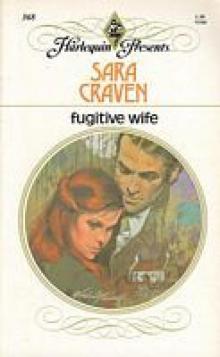 Fugitive Wife
Fugitive Wife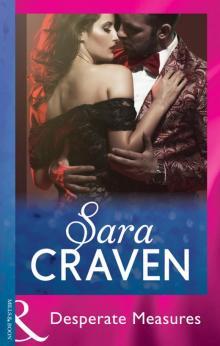 Desperate Measures
Desperate Measures Ultimate Temptation (Harlequin Presents)
Ultimate Temptation (Harlequin Presents) The Highest Stakes of All
The Highest Stakes of All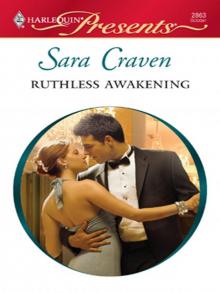 Ruthless Awakening
Ruthless Awakening Rome's Revenge
Rome's Revenge Forced Bride
Forced Bride Summer of the Raven
Summer of the Raven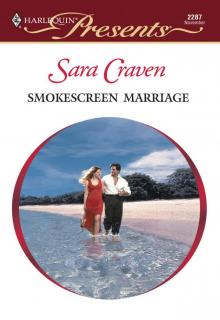 Smokescreen Marriage
Smokescreen Marriage The Innocent's Shameful Secret
The Innocent's Shameful Secret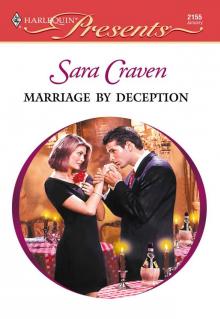 Marriage by Deception
Marriage by Deception The Virgin s Wedding Night
The Virgin s Wedding Night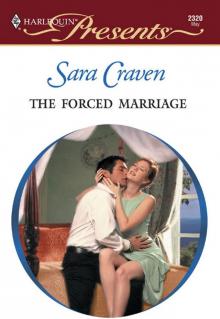 The Forced Marriage (Italian Husbands)
The Forced Marriage (Italian Husbands) The Innocent's Sinful Craving
The Innocent's Sinful Craving Inherited by Her Enemy
Inherited by Her Enemy Wife in the Shadows
Wife in the Shadows The Innocent's Surrender
The Innocent's Surrender Storm Force
Storm Force The Seduction Game (Harlequin Presents)
The Seduction Game (Harlequin Presents) The Santangeli Marriage
The Santangeli Marriage In the Millionaire's Possession
In the Millionaire's Possession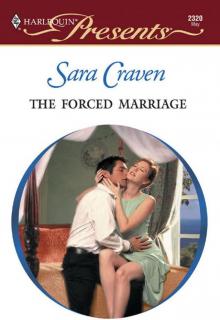 The Forced Marriage
The Forced Marriage Alien Vengeance
Alien Vengeance A Nanny for Christmas
A Nanny for Christmas His Reluctant Bride
His Reluctant Bride Heart of a Hero
Heart of a Hero The Price of Retribution
The Price of Retribution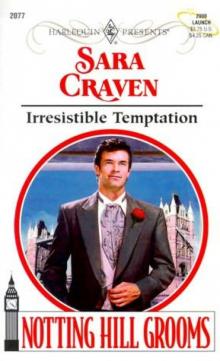 Irresistible Temptation
Irresistible Temptation Dark Apollo
Dark Apollo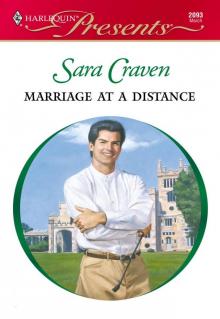 Marriage at a Distance (Presents, 2093)
Marriage at a Distance (Presents, 2093) Count Valieri's Prisoner
Count Valieri's Prisoner The Innocent's One-Night Confession
The Innocent's One-Night Confession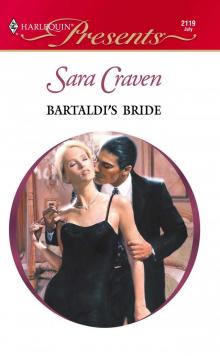 Bartaldi's Bride
Bartaldi's Bride His Untamed Innocent
His Untamed Innocent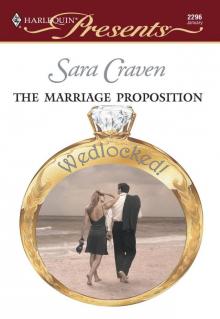 The Marriage Proposition
The Marriage Proposition The Right Bride?
The Right Bride? The End of her Innocence
The End of her Innocence